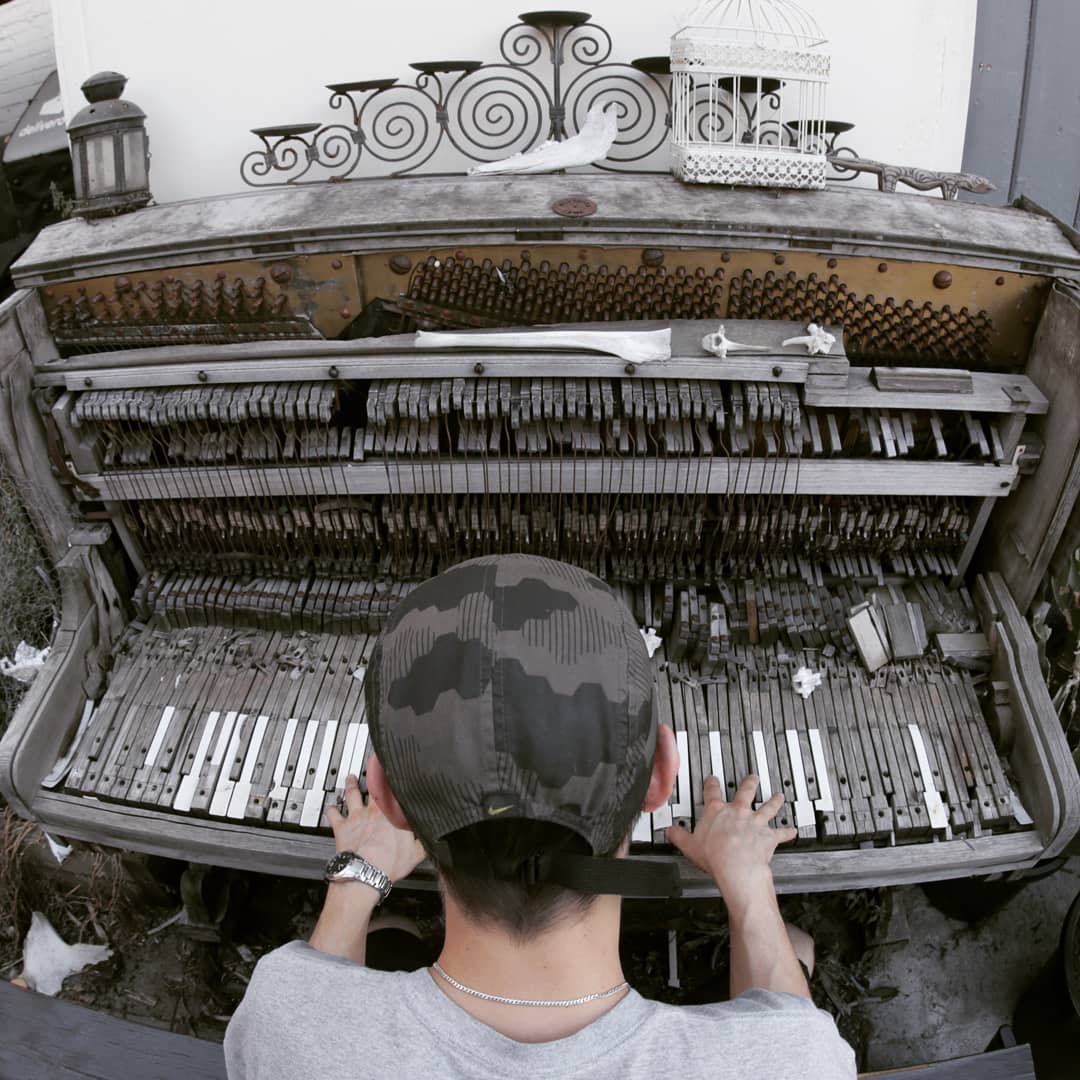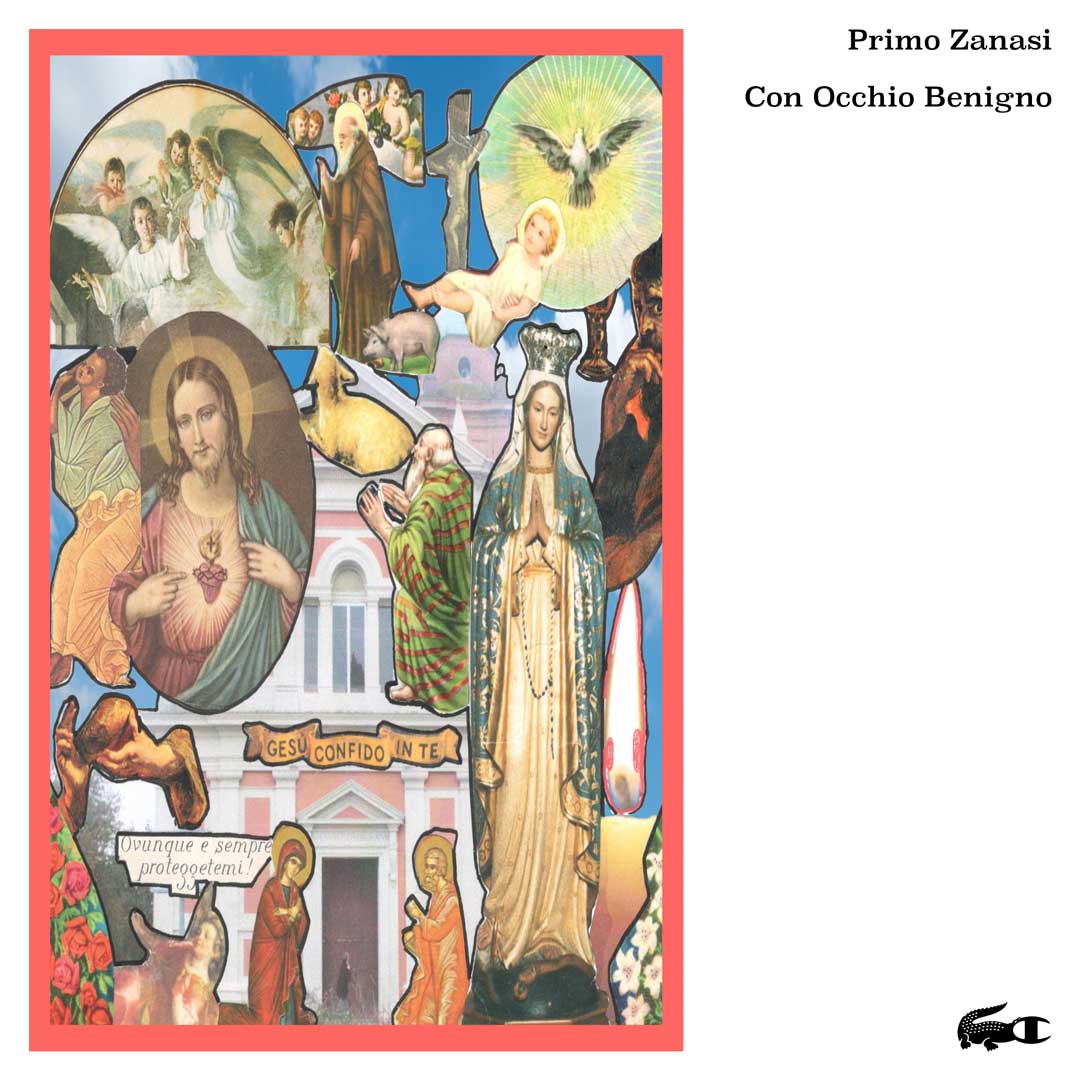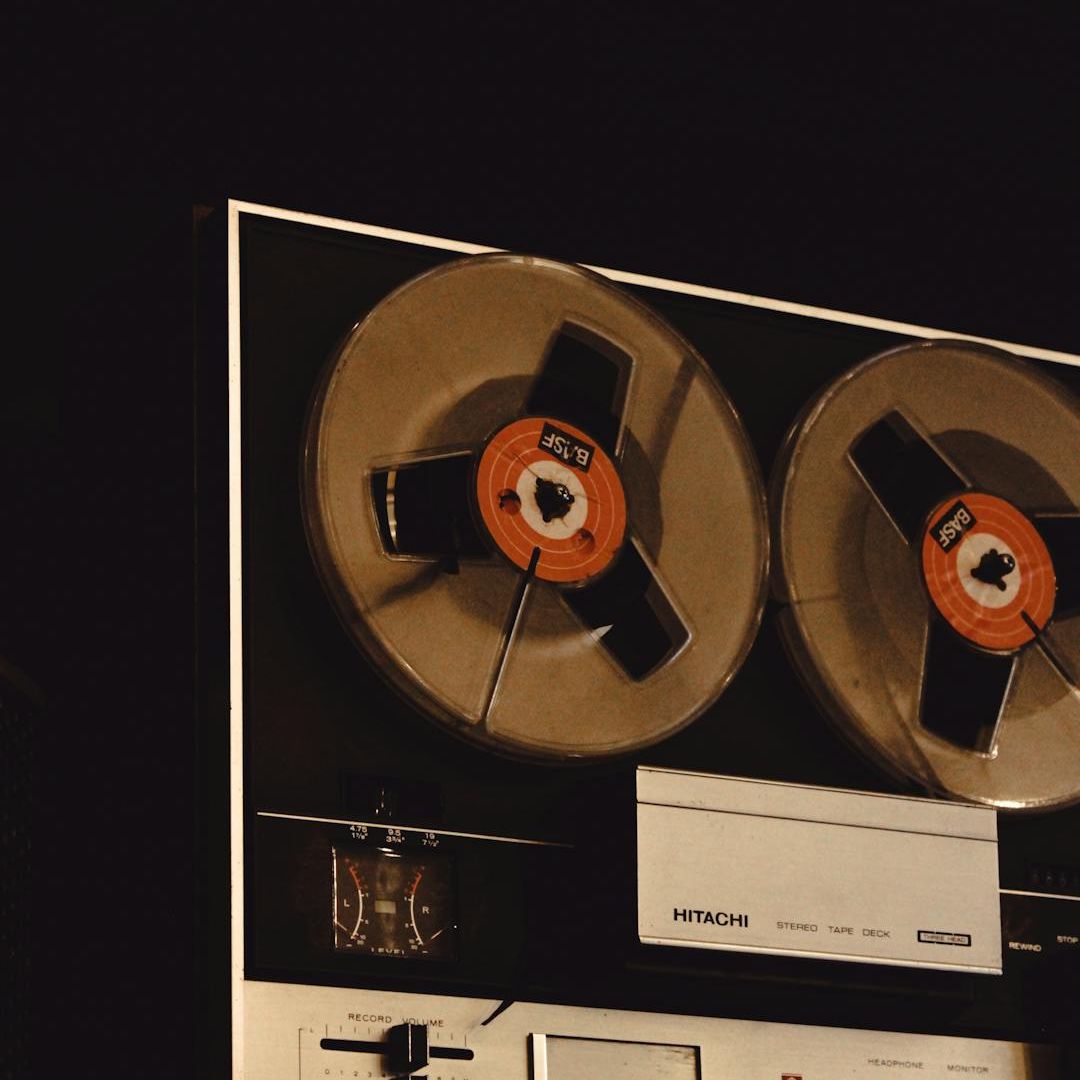Billy Bogus got the swag to rock the dancefloors, unconventionally.
It is not an everyday thing to come across a small sound pearl by pure chance. In the oceans of audio junk where we’re navigating these days, finding the good stuff is getting harder and harder. Fortunately, every now and then the compass of good taste takes us back to islands of well-being.
In this case, we piratically introduce Billy Bogus e Pizzico Records, Italian excellence perhaps better known outside Italy than at home. A story that already has years of dense releases under its belt, which goes beyond genres and easy labels, and speaks the Esperanto of good music.
These days, with the excuse of the brand new release “Agguato ai Caraibi“, which follows the excellent “Tensione Casio” (the spark that lit the torch in the dark of night sailing) by a few months, we talked to Billy and learnt a lot about him and the trajectory of the label.
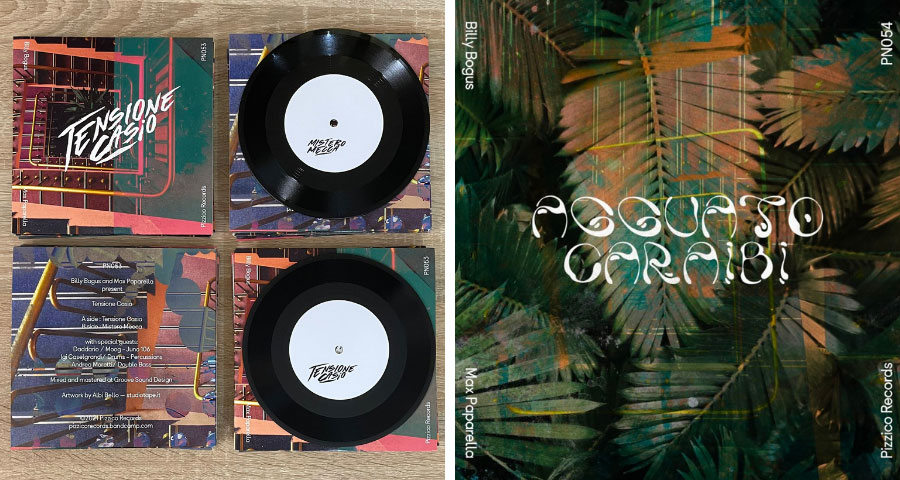
Billy Bogus and Max Paparella latest 7″ on Pizzico Records
The idea of an “endless movement”: how Pizzico Records was born.
Pizzico Records was born in the now distant 2007, in a very different musical era from now. It was a time when almost everyone was infatuated with the mono-sound of minimal techno. Anyhow, despite the clubbing tastes of the time, slowly but surely the label found its way into the world.
We’ve loved the idea of “politically incorrect aesthetics to sound the dramatic and obscure sides of last decades” – quoting their label description. Possibly because they start from the adamant assumption that “all the true art on earth is dirty and turbid”.
Between double identities and countless nicknames, Italo disco, libraries and soundtracks inspiration, the worlds touched by Pizzico are communicating with each other. Intriguing worlds, just as can be heard in the recently sold-out 7″ vinyl “Tensione Casio“. Worlds made of suggestions and wordplay.
Speaking of which, and small puns, as Billy told us, “Pizzico” derives from the verb “to pinch”, borrowed from the jargon linked to the use of heroin in the Eighties…it was the sense of perpetual motion, according to some.
The name was adopted with the intent of reworking and rediscovering – but also contaminating – the most classic sound of legendary Italian clubs such as the Baia Degli Angeli and Cosmic. Back in 2006, no one really thought of this all-Italian drift as an alternative to the usual techno clubbing. But they did.
“We were perhaps among the first Italian benchmarks, such as Mad on the Moon in Milan, to enter a more “afroid” concept of electronic music, still following the remarkable work of brands such as DC recordings or Bearfunk in the UK“, Billy told me in one of our chats.
We know, moreover, that Italy has always unfolded in dozens of small, high-quality realities, often ahead of their time.
In fourteen years of activity, the label has accumulated releases from various European artists and endless parties. After collaborations with characters such as Andrew Weatherall (RIP), Erol Alkan, In Flagranti, Daniele Baldelli, Trevor Jackson and many others, Pizzico Records has rocked countless dancefloors.
Until it gets to us.
Ciao Billy, and welcome to StrettoBlaster. Would you like to start from the beginning of your musical journey and introduce yourself to our readers?
Hello, SB’s readers! I hail from Italy and have been a DJ, Producer and Sound Designer since the mid-90s. I began by sampling records by De Funkt, Donna Summer and Nino Rota. My DJ sets at the time were a mix of downtempo, Hip-Hop and Jungle. I had been doing simple audio/video installations since I was quite young in Modena – the « capital » of Emilia-Romagna’s own Motor Valley – where I was born and still live to this day.
I have been running my own label, Pizzico Records, and the related catalogue (which I also use for advertising, video and commercial works) for fourteen years now. I have been trying to use the music I love for anything, not only for business, to make it a fundamental part of my life. Now, at 44, I can easily say that music is all my life, past and future.
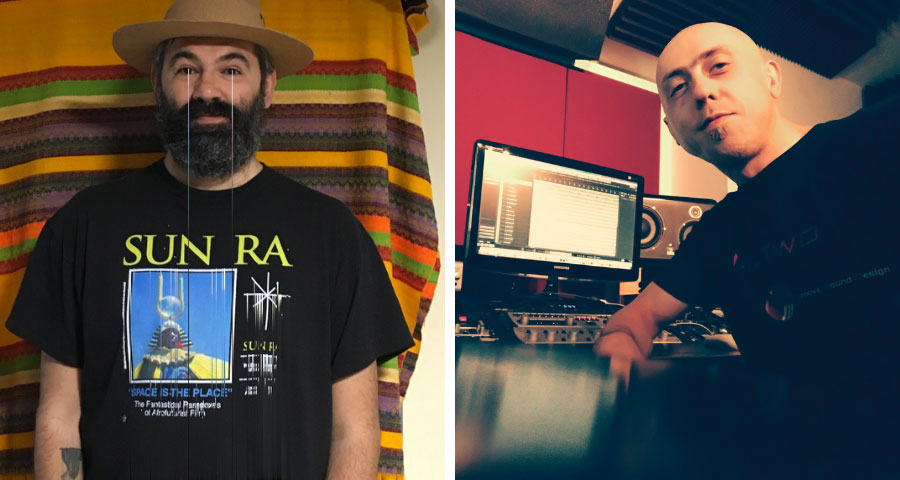
Billy Bogus and multi-instrumentalist Max Paparella
You’ve got a long journey under your belt, across several genres of music and different monikers, as you’ve shared with me. How would you describe it?
I would say my career is like a big patchwork of sounds, strong passions (often very short-lived) and the desire to lose myself in a B-side, far from chaotic and often harmful rumours.
Music needs magic, mystery and above all needs intimacy, a concept which is now lost. Under my most active moniker, Billy Bogus, I do the best I can to manage my recreational activities, from experimental DJ sets to my label Pizzico, to productions for other labels.
The Caribbean House is my live project, side by side with two icons of the ’90s Italian Punk and Electronic scene: Federico Bologna (Technogod) and Cristiano Santini (Disciplinatha). And again: with Strata-Gemma, my Jazz ensemble, I search for a new definition of World and Library Music, R¥ALTO is an impromptu post lounge record (my definition) with a wink at Vapor Wave.
And finally, Night Movie, a night event where I preset music on an ensemble of movie extracts trying to give new meaning to the images and visions I have always been drawn to, as a movie and soundtrack collector.
I know, it’s a lot…All these different monikers can be quite dispersive on a communication level but this is about consistency: every sound has a peculiarity and must also have a name, if you are expecting Strata-Gemma you cannot find Billy Bogus, and vice versa. Also, if other musicians are also involved – as often happens – they need to feel like they belong to a project with a collective sense of identity.
There is way too much egomania in the music industry nowadays: the sound is the one that should be the protagonist in my opinion, not the musician.
Speaking of the industry, the music, and your journey…What’s changed, looking in hindsight, and what has stayed the same throughout the years?
I relate to your previous question to answer this. The real paradox today is the pomposity which is often attached to a name, the desire of pushing the ego above the music (perhaps because people don’t listen to it that much anymore?).
I come from a very lively environment where you didn’t even see the DJ in the club, you often went clubbing without knowing who was playing, only to breathe in the real « movement » of people caused by records and productions. Today the scene is pretty different, the ego prevails despite a break of a year and a half (because of the pandemic), a time which should have been a chance to think it over.
Of course, there is also a positive side: without the technological progress of the past fifteen years, I wouldn’t have been able to put together and produce some records and make them notorious.
There’s always hope and it’s important to be able to distinguish the positive push from the rubbish. It is necessary to work on yourself daily to learn to enjoy what’s good and beautiful out there.
Indeed, Pizzico Records was born 14 years ago: what are the three fundamental records that everyone should listen to understand the label and its full trajectory?
Hard one! I cherish every single one of my productions as they are all connected to specific times and memories. If I make an effort I might extrapolate some works which have more significance not because they are of better quality but because they meant a change of path, a sign that I was doing my job properly.
Dennis Young & Loudtone – Mnon Garr
I couldn’t believe that Dennis Young of Liquid Liquid, David Love Calò (Morphine, Cocoricò) and Umberto Saba were going to be released by my brand new label! I did my best to measure up with a Bogus remix and I can say I delivered as I still get asked to play it.
Tabernacle Compilation – AA.VV.
Not one but three records, encasing the whole essence and desire of the label for experimenting with the collaboration of several incredible artists of the time. Among the tracks, « The Aftermath » by Johnny Paguro stands out, as of today still very enjoyable and fascinating to play. A true hit of the genre played everywhere, and still in a few DJ’s bags who still plays it every couple of years and rediscovers it with unchanged wonder.
Ciao Fellini – Noche a Bahia (The Remixes)
Pizzico’s 10th birthday was a big one: three different parties in my city and a record of remixes to celebrate Ciao Fellini. Friends and fellow citizens come first -especially Jumbo, the leader- and true « Italo Disco » icon, a genre always entertained by Pizzico and that is now living a second youth. Among the remixers were also DJ Rocca and Severino of Horse Meat Disco.
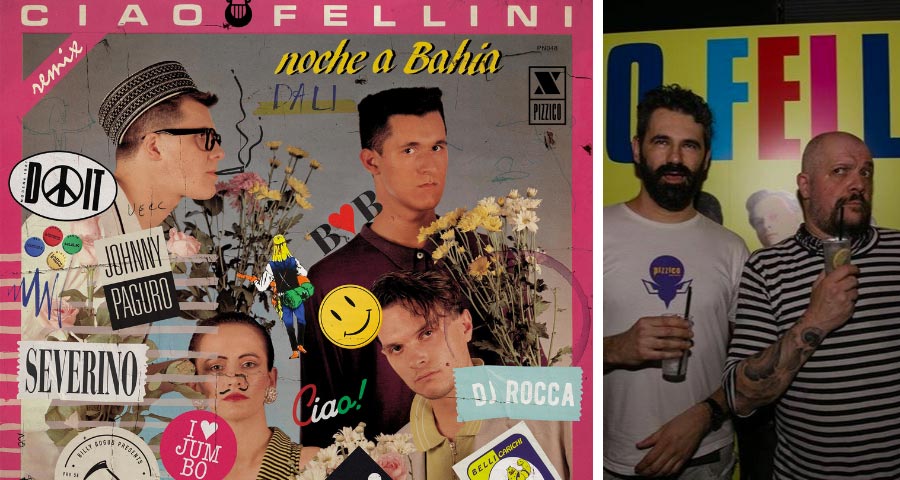
Billy Bogus and Jumbo Manfredini from Ciao Fellini
Coming to the main reason we’re discussing today: your latest 7” titled “Tensione Casio” has gone sold out immediately, and it’s already a myth among record diggers. Would you like to talk a bit about its genesis?
It’s an ultra-limited edition so it might be a bit much to use the word myth let’s just stay that among admirers and friends there was a lot of immediate interest and the few available copies ran out very quickly.
The idea of Tensione Casio came into life from the friendship and partnership with Max Paparella, organist and sound engineer I had the pleasure of share the stage with during a few sessions with Strata-Gemma: our technical and emotional accord grew stronger during lockdown when we exchanged advice, feelings and suggestions for new tracks above all.
The first challenge of Tensione Casio – coming after several DJ sets, aesthetic and musical references to genre cinema– is being finally able to create a soundtrack for that kind of imagery: I am talking about Mondo Movies, 60s psychedelic Neo-Noir, but also Cannibal Movies, from Massacesi to Deodato/Lenzi.
The second challenge was that the creation comes from a sampler not from a band, something I usually do for all my productions, and we go ahead until we reach the top of instrumental naturalness on the sampler, but with a very hip hop approach. The third challenge, like a small short circuit, was to include real musicians as to make it all more refined: Max’s skills has made the project real and flawless, from synths to the final mixing, all analogue.
The contribution of a few fine professionals such as producer Daddario Casillo (sound engineer for Umberto Tozzi and Stadio), string bass player Andrea Moretti and drum player Igino Caselgrandi have been fundamental to bring a great atmosphere to the whole production.
The final result was beyond my expectation and I hope that any cinema addicted, like me, could appreciate the several musical references and influences.
For the title track « Tensione Casio » the reference could be Zabrinskie Point by Michelangelo Antonioni or something more obscure like « I Cannibali » by Liliana Cavani or « Escalation » by Roberto Faenza, while for the b-side «Mistero Mecca» I like to think about «Zombi 2» by maestro Lucio Fulci and even more to the unacknowledged and more recent « Comfort for Strangers » by Paul Schrader, where Venice in the background reminds of Constantinopolis.
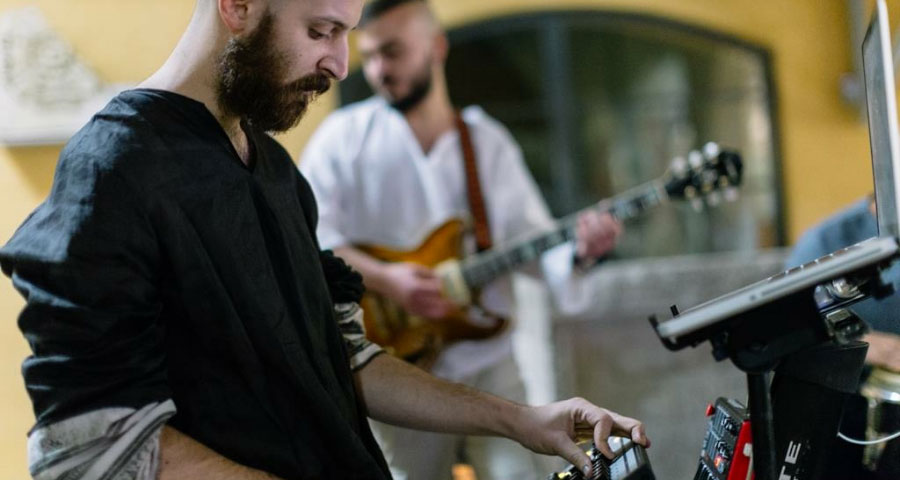
Sound engineer and producer Daddario Casillo
How would you like people to approach your newly released 7” Agguato Ai Caraibi, instead? Can you give us some hints?
I’d like people to think about the next 7 inches like some sort of music/film sequel on top of a shift of film genre. Here the imagery is slightly more funk and linked to old Italian crime movies, “poliziotteschi” without forgetting the psychedelia of the first record: I think of Fernando di Leo but also all those 60s Italian/Spanish spy movies like « Baleari Operazione Oro ». This is the movie universe that inspired the A-Side.
For the B-side, we find ourselves in the post-apocalyptic New York as imagined by Enzo Castellari, where a slow and atmospheric funk opens up to unexpected flashes of light.
We are very happy with the result, we worked a lot on it as both myself and Max Paparella can be really obsessive about details, but we also have lots of fun. The final analogue processing is what fascinates me the most about the whole four-handed creation process.
You listen to a lot of music, from different genres, and you still dig in the crates for your records. What kind of influences came to play while creating music nowadays? Last record you have bought?
Given my twenty-five-year-old experience with sampling I always aim to buy old vinyl, possibly forgotten, sometimes lousy, as a matter of fact; anyway as a good Emilian, I don’t bin anything and I always believe that even a bad record, if it doesn’t help to create a beautiful one, will most certainly make it interesting.
Movies are what has inspired me the most to produce music in the last few years, not necessarily the single soundtracks but the totality of moods and emotions conveyed by the film itself. It might sound strange but sometimes I think that the tracks I am producing are in perfect harmony with the film I am watching.
It’s my personal technique to reach for that no-place in my memory and my emotionality: from time to time I fail but if I succeed I can go far…The last record I bought is a reissue of “Misterios Cosmograficos” by Chilean musician Jose Ignacio Valdes, edited by an Italian label I wasn’t familiar with, Orbeatize: I was pleasantly surprised.
A final word to our readers?
If you are desperately trying to understand why we got where we are with the so-called « modern society » just watch old movies and listen to the soundtracks: you can find there all the answers. Big hug.

